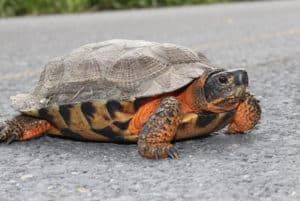The Connecticut River Conservancy (CRC) has received a new grant from the National Fish and Wildlife Foundation (NFWF) that will help protect native turtles. The grant will fund landowner outreach by CRC and wood turtle site assessment by project partner, The Orianne Society (TOS).

The native wood turtle and its habitat will be a main focus for environmental protection.
Wood turtles (Glyptemys insculpta), primarily found in river floodplains, and spotted turtles (Clemmys guttata) are the special focus of this project. Wood turtles are considered a species of conservation concern in the three states where CRC will focus outreach efforts. These turtles have suffered declines due to illegal collecting, development, agriculture, and stream alterations. CRC and TOS will work with federal and state agency partners in New Hampshire, Vermont, and Massachusetts to find willing landowners and sites that will lead to improving working lands, water quality, and wood turtle habitat in the Connecticut River watershed.
“Wood and spotted turtles thrive in environments with clean water, but they need space to roam on land as well, so improving habitat connectivity between land and water benefits them greatly. This not only helps rare turtles, but also creates habitat for other fish and wildlife, cleanses the water, and improves recreational opportunities. Farm bill conservation programs also promote agricultural sustainability. Programs like this are a win for everybody” said Kiley Briggs, director of conservation with The Orianne Society.
The USDA Natural Resources Conservation Service (NRCS) has designated northeast turtles as a “working lands for wildlife” priority and offers programs to help with their conservation. The U.S. Fish and Wildlife Service and each state wildlife agency have prioritized the restoration and preservation of the wood turtle, advancing both conservation science and action plans. This grant will help unite efforts by this coalition of organizations and find new project sites to help this species rebound and thrive.
“Strong partnerships form the backbone of this project,” said Ron Rhodes, CRC’s director of restoration programs. “In addition to working with landowners, CRC and TOS will collaborate with all three states and our federal agency partners to ensure we identify areas that are most in need of restoration and maximize the benefits to both the turtles and landowners.”




